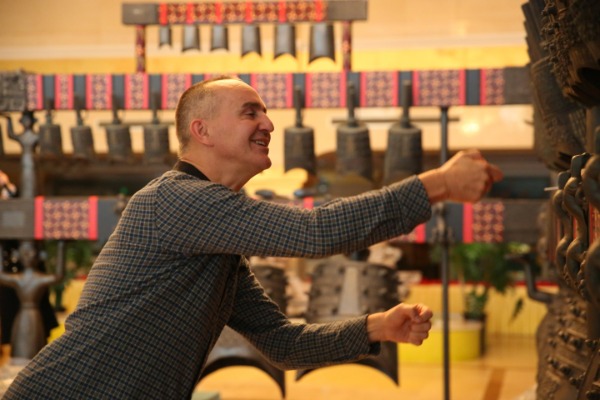German composer creates a symphony of chimes


"The chime bells of Marquis Yi prove that music was regarded highly by the royals back then. As such, it shouldn't only be stored in museums. We need more musical scores to keep these bells alive," says Zollitsch.
The composer's plans of reviving the instrument also include training professional ensembles, having composition competitions, as well as publishing books about it.
In 2007, Zollitsch adapted a set of poems called Jiu Ge, or Nine Songs, by Qu Yuan, a poet from the Warring States Period. Although one of the poems, titled Shan Gui, or Ghost of Mountains, was written for the bianzhong, the German could not find bianzhong musicians to perform the piece and had to turn it into chamber music instead.
In 2013, Zollitsch composed a bianzhong piece titled Resounding Chimes as part of a collaboration with Yan Huichang, the artistic director of the Hong Kong Chinese Orchestra. The musical piece was later performed by the Hong Kong Chinese Orchestra and the Chinese Bianzhong Orchestra in a 2014 concert titled Chiming Notes That Resonate through Two Millennia - Opening Concert of the 37th Orchestral Season.
With the help of the bianzhong orchestra from Suizhou Museum, Zollitsch has written three songs centered on the instrument so far. The orchestra, which was founded in 1988 and has more than 30 members, performs daily at the museum using a 65-bell set.
"Bianzhong represents ancient Chinese culture. It's our dream to revive the instrument," says Nie Rong, the director of the orchestra.
Born and raised in Munich, Germany, Zollitsch came to China on a scholarship to study the guqin, the seven-stringed Chinese zither, in Shanghai in 1993. He met his wife, Chinese folk singer Gong Lina, at a concert in Beijing in 2002. Gong has throughout her career performed many works by her composer husband, including his latest bianzhong pieces. The couple are known to be passionate about reviving traditional Chinese folk music by infusing the genre with a contemporary twist.
Born in Guiyang, the capital of Southwest China's Guizhou province, Gong started learning how to sing Chinese folk songs at a young age. She joined the China Conservatory of Music in Beijing when she was 16 and went on to sing for the China National Traditional Orchestra after graduation. In 2000, Gong won the Best Female Singer Award at the Chinese National Singing Competition and became a popular figure who appeared on various TV shows. In 2009, Gong received praise for the song Tan Te, or Disturbed, which was composed by Zollitsch. The couple followed up on that achievement by releasing more songs such as Fa Hai, You Don't Understand Love. In 2017, they selected 24 traditional Chinese poems and turned each of them into a song with a title reflecting the 24 Solar Terms, a traditional Chinese calendar.
"When I sing the songs with the bianzhong behind me, I feel like I'm being transported to ancient China. It gives me goose pimples, and it feels great," says Gong.
"What makes Chinese music unique is the tradition. That's what we want to show the audience, especially the young generation."





































